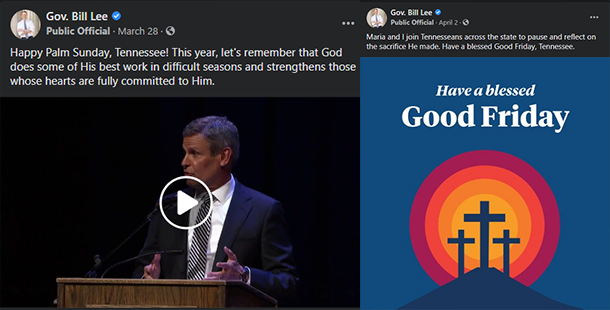
Stop excluding nonreligious citizens by posting sectarian religious messages on your social media, the Freedom From Religion Foundation is chastising the Tennessee governor.
A concerned Tennessee resident has contacted the national state/church watchdog to report that Gov. Bill Lee has a pattern of posting religious messages on his official Facebook, Twitter and YouTube accounts. For instance, one of his official tweets quotes Luke 2.14: “Glory to God in the highest, and on earth peace, good will toward men.” And a post from a few months ago on his official Facebook account quotes Psalms 90: “Let the favor of our Lord God be upon us, and establish the work of our hands upon us; yes, establish the work of our hands.” These are just a few examples of dozens of religious postings he has sent out over the past couple of years.
As governor, Lee represents a diverse population that consists of not only Christians, but also minority religious and nonreligious citizens, FFRF emphasizes. Sectarian religious endorsements made in his official capacity send a message that excludes the 30 percent of Americans who are non-Christians, including one in four Americans who is religiously unaffiliated. By couching his sentiments in religious terms, and by quoting exclusively from one religion’s holy book, Lee unnecessarily excludes a significant portion of the community. These social media posts send the message to nonreligious and minority religious constituents that their participation in the political process is less valued than that of their Christian counterparts.
Our Constitution’s Establishment Clause, which protects all Americans’ religious freedom by ensuring the continued separation of religion and government, dictates that the government cannot in any way endorse religion, FFRF reminds the governor.
“The First Amendment prohibits even the appearance of religious endorsement by government officials,” FFRF Staff Attorney Chris Line writes to Lee. “Promoting your personal religious beliefs on your official social media pages violates your obligation under the Constitution as a public official.”
And the Supreme Court has described the power of social media sites as “the principal sources for knowing current events, checking ads for employment, speaking and listening in the modern public square, and otherwise exploring the vast realms of human thought and knowledge.” That’s why government officials must be particularly diligent not to entangle their personal religious beliefs with official government pronouncements made in this “modern public square,” FFRF stresses. Courts are willing to treat accounts that politicians believe to be private as official government accounts when they are used to disseminate official communications (as in Hawaii v. Trump). FFRF sees no legal reason why Lee’s social media pages would be treated differently.
Government officials can worship, pray or quote any religious text they wish when acting in their personal capacities, FFRF underscores, but they are not permitted to provide prestige to their personal religion by lending a government office and government title to religious ideology. As governor, Bill Lee is charged with great responsibility and has been given significant trust by citizens of the great state of Tennessee, including those citizens who do not share his religious viewpoint. Sticking to secular messages is inclusive of everyone and honors our Constitution — the document he swore to uphold when he took his oath of office.
This is why FFRF is asking Lee to disassociate the governor’s office from his personal religious beliefs and refrain from posting religious messages on his official social media pages.
“Social media should be a venue for officials to communicate with all their constituents and not to communion with a believing subset,” says FFRF Co-President Annie Laurie Gaylor.
The Freedom From Religion Foundation is a nationwide nonprofit organization with more than 35,000 members and several chapters across the country, including over 400 members and a local chapter in Tennessee. Our purposes are to protect the constitutional separation between state and church, and to educate the public on matters related to nontheism.
